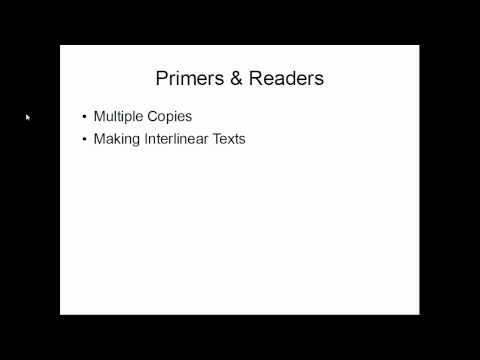One of the members here at lingq (Peter from Australia) asked me to explain what I do in order to maintain a rather advanced level in my working languages. Actually, Peter asked me to make a video about this but I thought I might try and outline some of my daily language routine here in this forum.
The key element is consistent usage of the language. I use my working languages on a daily basis. If I do not translate and/or interpret in one of them on a specific day, I try to make sure I spend at least 15 to 20 minutes reading, writing or listening in that language.
I consider reading and writing crucial. I seem to retain information better when I see it written and read it aloud, while I prefer listening to work on my pronunciation. Before a conference, I practically always read some texts aloud in the language I am going to work in. Very much like a singer who trains his voice before he goes on stage.
Since I am lucky enough to be very busy with work, I get enough exposure to the languages I use professionally. So I use them on a daily basis. Translating a text automatically involves reading and writing. It is not enough to just absorb information but you also need to process it and that probably is one of the most important factors. I do not just take a sentence and try to render it in another language but I actually work through the content of the sentence and the entire text for that matter in my mind. I’m immersed in the topic of the text and that sometimes also requires further reading on a specific subject (both in the source and the target language).
I still enjoy writing by hand and I do so on a regular basis. Mind you, not every day but I probably write about 50 to 80 pages per month (in several languages). I find this to be extremely useful and as strange as it may sound I also very much enjoy doing it.
I mostly copy books and/or articles from newspapers and magazines.
I rarely revise grammar but I do when I’m in doubt as to the proper usage of certain structures. I also enjoy reading good dictionaries. I read them like I would read a novel. However, for this exercise to be useful the dictionary needs to be one with example sentences.
I often try to expand on the examples given, changing the subject or the object of the sentence and sometimes even making a little speech out of one entry in the dictionary which I use as some sort of starting point. So, a short and simple sentence like “Yesterday it was raining heavily” may lead to a “speech” about the damage caused by floods etc. This is an excellent way to see how comfortable you are with using words in context.
Should I find it particularly difficult to express my thoughts or realize that I lack important vocabulary when talking about a specific subject I have no trouble talking about in my native tongue, I look up all the words I need to fill these gaps. The more often I do this, the less frequent I run into this kind of problem.
I also enjoy “creative writing”, i. e. I write essays, even poems, in some of my working languages. This helps me to explore all facets of the languages instead of just concentrating on the kind of texts I work with as a translator and interpreter.
What it basically comes down to is a lot of exposure and active usage of the language. Of course, I cannot do the same with all the other languages I am interested in. I have to set priorities. This is also why I don’t think I’ll ever be able to achieve the same level in all languages I have set out to study, at least not on a permanent level.
Whenever I can, I try to speak the languages both with native speakers and fellow learners.
As time goes by, you will be able to reduce the amount of daily practice to keep an advanced level of proficiency because you will have created a sound basis for your mind to work with.
I think a generally positive attitude towards the permanent learning process itself (I will never be able to say I really “know” a language, I can only hope to keep learning) is also very helpful. I consider learning not a burden but a very enjoyable task. And I try to put things into perspective.
When I have to prepare for a very technical conference, I know I will have forgotten about 80 % of the vocabulary I am studying just for that conference after a month or so and this does not bother me in the least. If I need it again, I will simply go through the same process again without getting all upset because I don’t retain the meaning of words I probably hardly ever use in my native tongue.
I do make sure, however, that I regularly repeat high frequency vocabulary. I know there are quite a few people who don’t consider these lists of words very useful. For me they are some sort of a safety net. In my line of work the topics and/or vocabulary I’m dealing with may sometimes be rather specific and thus limited.
In order not to lose the ability to use standard structures typical of daily life conversations I make sure I practise the aforementioned “core vocabulary”. For this purpose, I mainly use books that contain 5,000 - 7,000 words with sample sentences.
I go through these books like every 3 to 4 months. The more often you do that, the quicker you’ll be. Sometimes I just take a glance at an entire page and go through the sentences in my mind, sometimes I walk around and read them aloud.
In doing so, I often “play” with the words by putting them in different contexts.
Well, this is about all I do.
And, of course, I also make sure I get enough rest, I normally need my 8 hours of sleep ![]()
I also try to spend as much time outside as possible. That gives me the energy I need for my work - besides, I absolutely love hiking (mostly alone, so I can rest my mind for a while).

